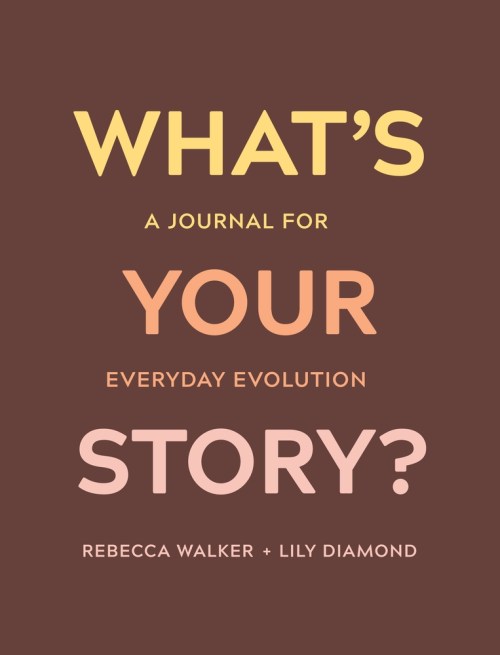Our editors independently select these products. Making a purchase through our links may earn Well+Good a commission
Yes, Journaling Can Be a Form of Activism—Get Started With These Two Prompts
Rebecca Walker and Lily Diamond's "What's Your Story?" journal invites you to practice activism through your daily entries.

Putting pen to paper gets its due credit for quelling symptoms of anxiety, increasing self-awareness, and amplifying an overall sense of gratitude. But journaling to further your activist pursuits? Explore political issues? Do anti-racist work? Those goals aren’t often front-of-mind when you turn to a blank page. In What’s Your Story?: A Journal for Everyday Evolution, co-authors Rebecca Walker and Lily Diamond challenge the everyday journaler to see how their lives are enmeshed in the stories of their communities so that writing really can be a force of activism.
Experts in This Article
writer and educator
activist, writer, television producer, and lauded speaker
“We feel strongly that activism can be supported and ignited through getting very clear about where our personal stories intersect with those major defining, shaping narratives—like late-stage capitalism, white supremacy, male hegemony—in which we move,” says Walker, an activist and writer.
Walker and Diamond first met each other at Walker’s Art of Memoir Masterclass—a seven-day seminar that teaches “fierce introspection.” A great deal of the practices and guided exercises in the book stem from that very class. “Many of the students who came out of Rebecca’s Art of Memoir course wanted to continue the work. So much of the locus of [workshop participants’] power came in unearthing the old stories and having the space to tell new ones. A lot of that happens through just being asked the right questions, through being given that invitation to a space of truth—and so the journal came out of that,” says Diamond.
To help you dip your toes into this particular type of introspection, the two authors color-coded the journal, with all cream-hued pages indicating questions and prompts that center activist pursuits. If you flip through the book, you’ll find these questions interspersed with others focusing on creativity, self care, spirituality, and grief—indicating that all of these components make up a 360-degree journaling practice. (Meaning: Without the activism sections, your story can’t be completed.)
“Once you start to do the work of understanding how you are implicated in a culture that is not serving everyone, it’s really up to you to begin to disentangle and stand with the people who are working to transform that world. To us, that’s inextricable from the work of revisioning and remaking our own identities,” says Walker.
Below, the dynamic journaling duo offer two writing exercises to get you started.
Two activist prompts from the What’s Your Story? journal
Before inviting journalers to dive into their prompts in What’s Your Story?, Walker and Diamond offer the following instructions: “Read each question. Turn it over in your mind until it evokes an image, sparks an idea, or inspires a reflection,” the book says. “Breathe. Start writing. Take up all the space you need. Write for at least five minutes. Take another breath. If there’s more to say keep writing…When the words stop coming, read over what you wrote, without judgment. Keep breathing. Be tender with yourself as you become aware of your truth and the way it feels in your cells, muscles, and bones. Then move on to the next question, or take a break. Whatever feels right in the moment.”
Here we go.
Prompt 1: Whose stories are uplifted and spoken in your communities, and whose are diminished or silenced?
Prompt 2. Where does your story place you within each community? At the center? At the margin?
These questions were excerpted from What’s Your Story? with permission from the authors.
Sign Up for Our Daily Newsletter
Get all the latest in wellness, trends, food, fitness, beauty, and more delivered right to your inbox.
Got it, you've been added to our email list.









